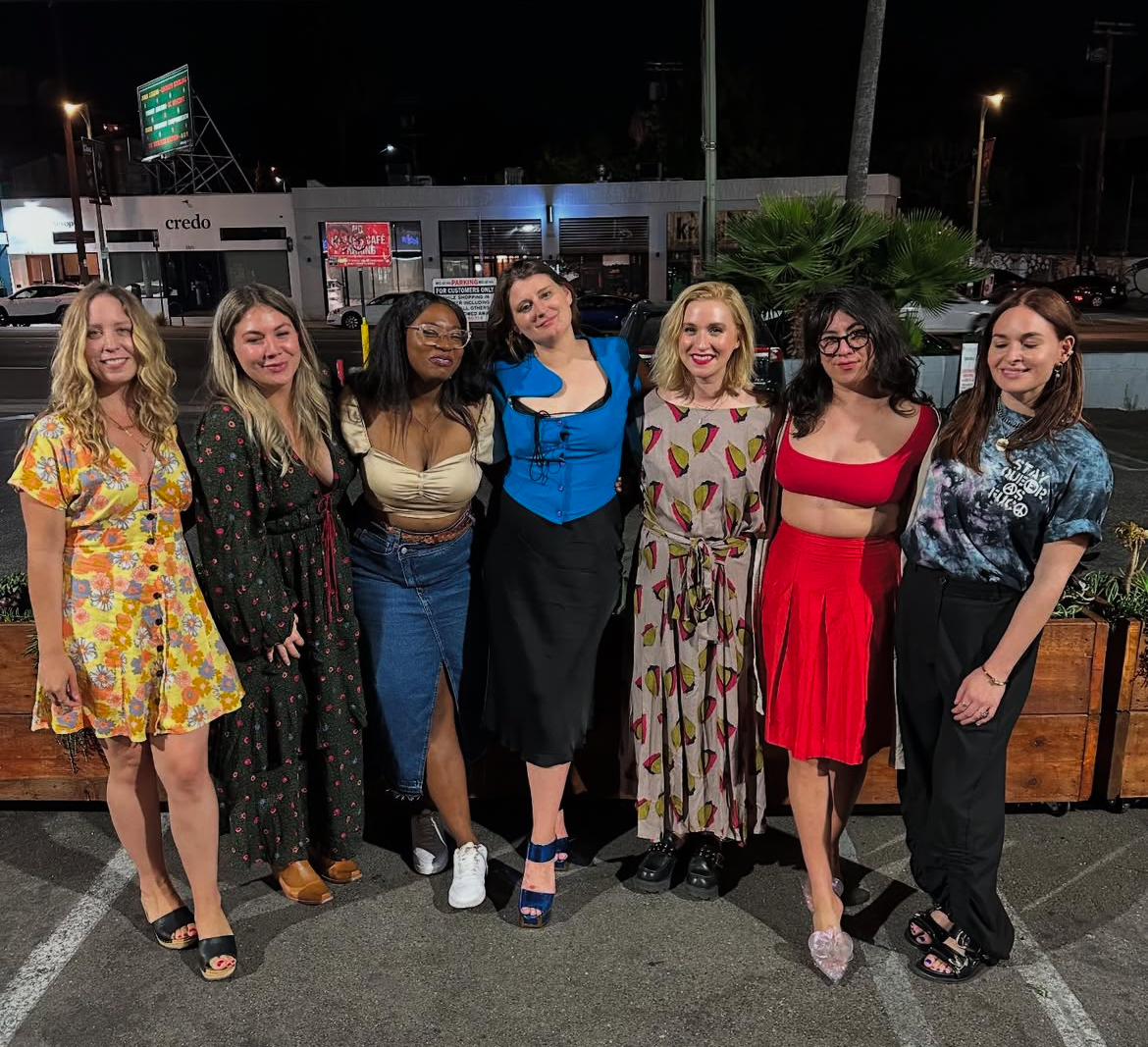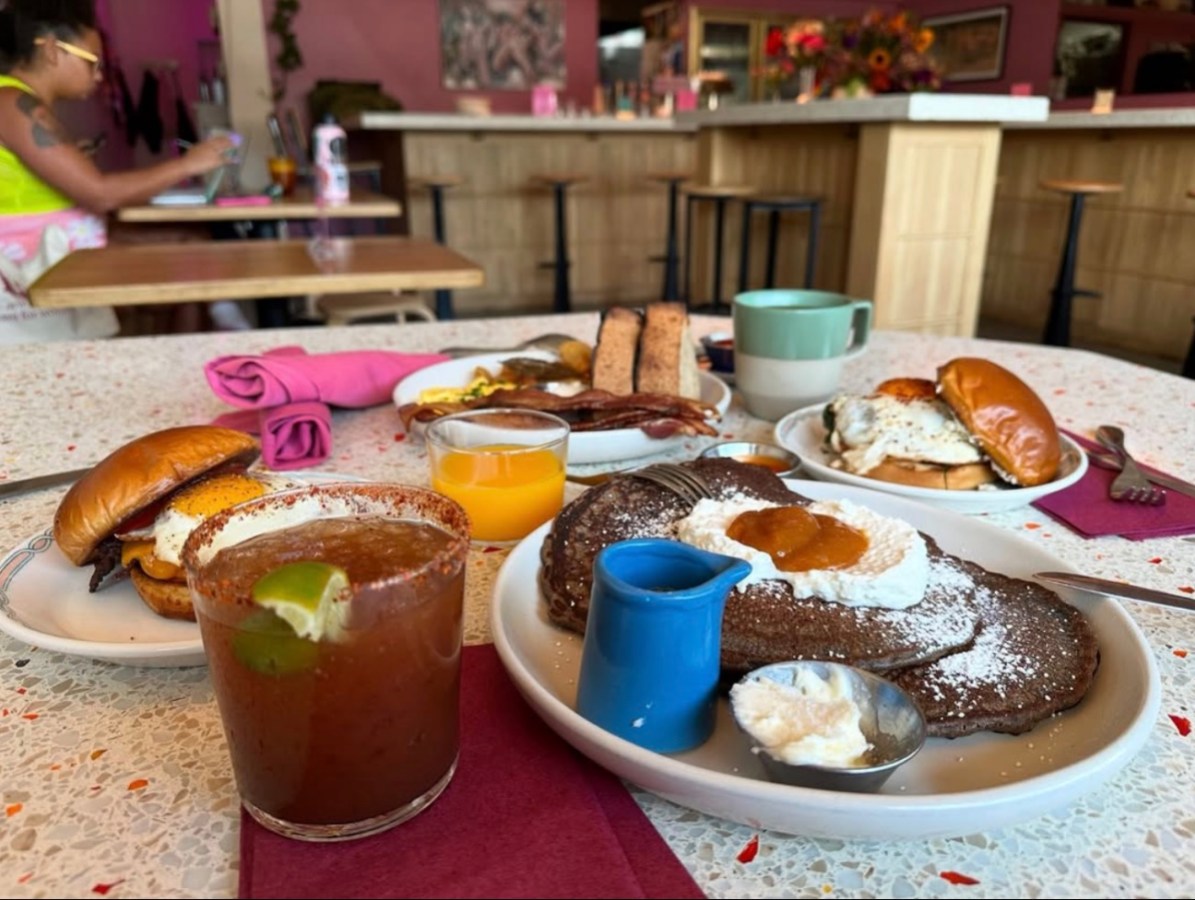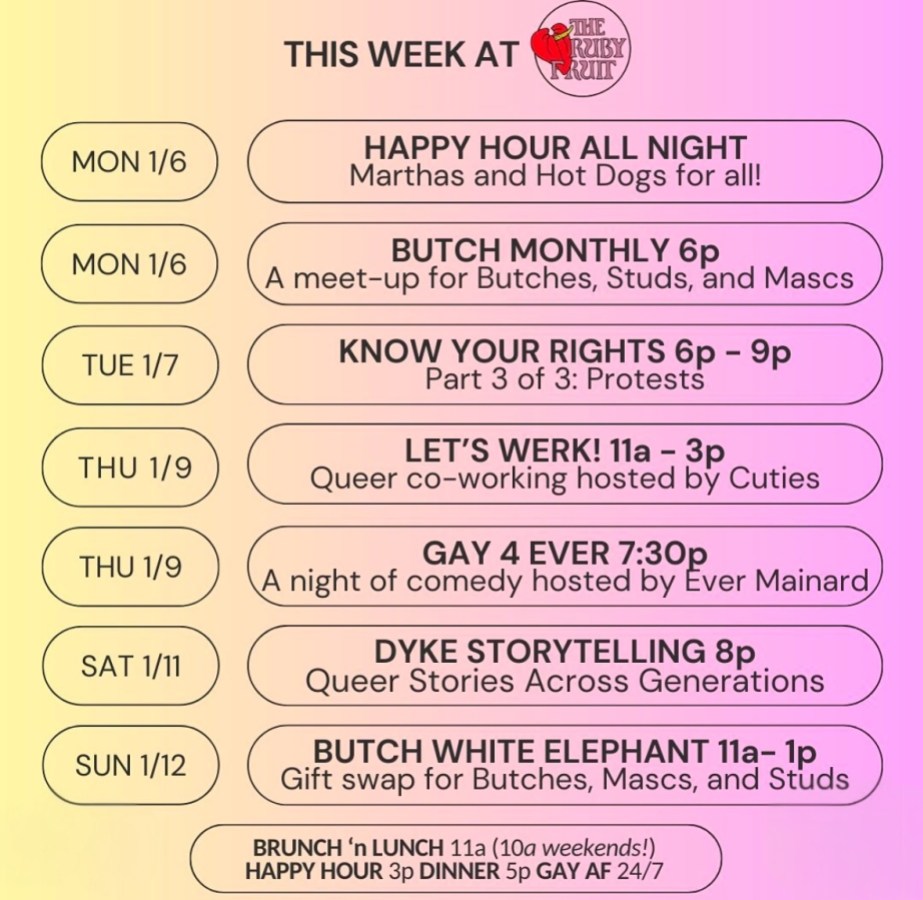Over the weekend, as wildfires raged across Los Angeles, Silver Lake’s sapphic wine bar The Ruby Fruit announced on Instagram that it would be closing its doors. “We have come to the heartbreaking decision that at this time, operating The Ruby Fruit is no longer possible due to financial impact from the current natural disaster,” the caption read. Every day counts in the restaurant industry, and just a short closure period had irreparably hurt their scrappy operation. “The math just isn’t mathing.”
The announcement was jarringly at odds with the experience of going there; mainly, that it was usually packed. The comment section reflected this vibe: their followers were shocked, and many begged for the chance to set up a GoFundMe to save the bar.
On Wednesday, January 14th, after a few days trying to schedule an interview with owners Emily Bielagus and Mara Herbkersman for this piece, they shared a statement indicating a shift of plans: “After much reflection and careful consideration, we are announcing the indefinite, but hopefully temporary, closure of The Ruby Fruit. This extremely difficult and heart wrenching decision comes as a result of the financial strain and operational challenges we’ve faced since our opening in 2023, which are now augmented by the recent fires in LA.”
They declared an intention to “regroup, reassess and come back stronger” in order to move forward. “Our focus is currently on supporting our FOH & BOH staff,” they wrote, “offering support to the community, tending to our physical and mental health, and ensuring that the future of The Ruby Fruit is as stable as possible.”
I hopped on a quick call with Emily and asked about the offers of help from patrons, but it was clear their regrouping plan doesn’t involve a crowdfunding campaign. “There are so many critical needs that people can address with their money right now and we really just don’t want to divert any of those funds,” Emily told me. One of those critical needs was the GoFundMe she pointed me towards, established to support their employees during this period of uncertainty.

The Ruby Fruit // Jessie Clapp
To understand why The Ruby Fruit matters, and why this potential second chance means so much to their community, you first have to understand LA and you have to understand the scarcity of lesbian bars nationwide.
First, the latter: there are only 37 lesbian bars left in the country, down from over 200 in 1980. There are heaps of theories about why it’s so hard for lesbian bars to stay open — a decline in demand as mixed-orientation spaces are more queer-friendly, because queer women don’t party like gay men do. But the explanation that feels truest to me is the most simple one: systemic financial inequality that favors men.
About Los Angeles: even before the fires, the past couple of years have been challenging and humbling. The whole world struggled through the pandemic, of course. The entertainment industry strikes of 2023 were also hard on the city, compounded by tightened budgets already sending more and more production out of state. From afar, people tend to think of LA as a superficial, polished, entertainment-obsessed place, full of self-centered rich people who don’t have real problems, and there definitely is some of that. But since the wildfires broke out in LA last week, this city has shown the world what many residents already knew, especially through the tight spots of the last few years — it’s a diverse city full of people who crave community and of neighbors ready to literally save each other. Through our grief and our fear we are all turning to each other in love and concern.
But when I first moved to LA, I felt lost, close to falling through its beautiful cracks. My wife and I settled in Silver Lake; a lush, hilly neighborhood on the east side so teeming with queers it’s easy to forget how important it is that we actually have specific spaces within that neighborhood dedicated to us. It’s hard to make friends as an adult anywhere, but it’s especially hard in a city that sprawls, that doesn’t have a lot of public transportation or third spaces where people talk to you. And then once you do start talking to people, it’s hard to know which friendships will last. When I got here, other than my wife, I had one very close friend. Otherwise I had a foot in many different doors, so for a while I kept meeting people from separate worlds, and struggled to feel like there was any sort of centralized community or group of friends I could fold into. Someone told me that if you’re not intentional with your social life in LA, it can turn into a series of one-on-one coffee dates with people you never hear from again. That rang true.
Plus, I felt guilty about feeling lonely in LA, like the sunshine and the palm trees and the hot pink bougainvillea and the A-list celebrities at the overpriced coffee shop were rolling their eyes at me as I cried a single pathetic tear on my stupid little morning walk around the reservoir, as if to say—you’re feeling sad and alone here? This most stunning place on earth?
And then—in 2023, a lesbian wine bar opened in an unassuming strip mall walking distance from my house, and something shifted.
I didn’t know about the opening night party, but I saw the photos the next day, a launch that spilled out the door with people lit gorgeously in the parking lot’s flood light, drinking and laughing in little clusters. An L Word fever dream. It even made national news. “The Lesbian Bar Isn’t Dead,” declared the New York Times headline, “It’s Pouring Orange Wine in Los Angeles.” Condé Nast Traveler: “Each Night is a Sapphic Street Party at The Ruby Fruit in Los Angeles.” I couldn’t remember the last time a lesbian bar (or, a lesbian anything?) had gotten so much high-profile press.
So my wife and I and two friends went, ASAP. And it was packed. Queer people huddled close to each other around little wooden tables drinking murky-hued wine out of tiny glasses. There were poreless Gen Zs with mullets, graying butches making their dates laugh, and carabiners everywhere, just so many keys dangling from beltloops. Everyone was talking and the windows were starting to fog. The couple we went with happened to be friends with Emily, and she cobbled together a little nook for us, squeezing us in.

Owners Emily Bielagus and Mara Herbkersman
The Ruby Fruit, when it’s open, is a dimly lit, cozy wine bar/restaurant where the vegan hot dogs are actually good and so is the rest of the menu. It’s a neighborhood lesbian bar that seems to say, our community deserves something really chic and elevated. If you want a messier, wilder night, you can go to a different gay bar and have a great time. If you want to eat a nice, dietary-restrictions-friendly meal with your friends/your date surrounded by other queers and still make your 9pm bedtime, The Ruby Fruit is for you.The bathroom is Indigo Girls-themed and outside it there’s a bulletin board where people left their numbers and notes for each other. You are as likely to see a famous bisexual from your favorite TV show as you were to see an ex you hadn’t thought of in a decade. It attracts a diverse, intergenerational crowd. You can get dressed up or you could go in sweatpants.
Listen: I’m not saying The Ruby Fruit is perfect. Those little wooden stools always make my back go into spasm and I never manage to spend less than $75 on cloudy wine and olives and fries. Dykes like to glare at each other across the room, that kind of undefinable does-she-want-to-fuck-me-or-does-she-hate-me look. When it was open, the space often didn’t feel big enough for the demand, and they didn’t take reservations, which made going feel like a gamble on weekends. You always had to have a back-up plan, where to go for dinner if you couldn’t get a table.
And you know what? I love it all the same.
It was like a sitcom fantasy of what adulthood would be like in a big city. As author and Silver Lake local Celia Laskey put it, “A sapphic bar walking distance to my apartment that opened shortly before my separation from my wife? Yeah, I was there like every week. It was my Cheers, where everybody knows your name.”

The author (in the long grey dress, third from right) in the Ruby Fruit parking lot’s “perfect flood lighting.”
My best memories of gay bars — like Cubbyhole and Ginger’s in New York — are of being so packed in like sardines that you have no choice but to talk to the girl next to you, and I worried that Rubyfruit’s cafe-style seating would mean no intermingling. But that wasn’t the case. We were often striking up conversations with the people sitting next to us or with people standing outside.
Because even the outside is nice; on the sidewalk, there’s a bar and stools and plants. Landscape designer Angela Huerta made custom wooden planters spilling over with lush green succulents for the bar’s front. “I decided last year that instead of dreading my birthday, I’d serve others and make my friends labor for me as a gift,” she told me. “So we made these four rolling planters. I raised a little money and supplemented it with my own money.”
As LA resident Jennifer Perlmutter told me, “Ruby Fruit was the place I walked to nightly when I first moved back to Los Angeles post-breakup. I would sit at the counter, indoors or out, and read a book. The staff was always more than friendly, they were conversational, and kind. They made it known that this place was more than a bar, it was a community.”
It also isn’t just a bar. They were open for lunch and sometimes my writer friends and I would go with the aim of working and instead spend the whole time talking to each other, laptops open but screens black.

breakfast at the ruby fruit
The thing about having a community hub, a place you return to again and again, is that it makes the city feel smaller. You start to run into the same people; you realize that friends you’ve made from totally different parts of your life already know each other— that we’re all more interconnected than we feel. Suddenly, sprawling LA felt like it had a center.
In April of 2024, The Roob, as people started calling it, took over the lease of the dentist office next door, cleverly named The Dental Dam. There, they were just starting to hold all kinds of events; parties and meet-ups and book clubs. At group readings like Empty Trash, hosted by authors Jen Winston and Greg Mania, you could hear a best-selling queer author read her unpublished work. Jen described the Dental Dam as “a space so magical it was almost futuristic—somehow both ahead of its time and right on time.”
I’ve participated in literary events at myriad LA locations — it’s rare to be able to count on anyone coming to anything at all. But it was different at the Roob’s new space. “You could hold an event there and people would just show up to hang out,” said writer Elizabeth Teets, who runs the reading series I Blame Television, where I once got to read an impassioned plea for a lesbian season of Love is Blind.

The Ruby Fruit’s last weekly event calendar
At this point you’d think we’d be used to the disappointment of a beloved queer space closing, but the thought of losing the Ruby Fruit permanently is landing in a different way. After all, unlike the smaller, dive-ier bars of yore, they had so much press. They had so many famous patrons. They were so often at capacity. The food was not cheap! And we still ordered it! En masse! If a lesbian bar like that can’t stay open, what can?
We won’t really feel the effects of its absence until things start to feel normal again in LA, if they ever do, after the fires are put out and the dangerous winds have settled. To Emily’s point, there are more urgent things happening in the city; so many people who have lost everything.
In the meantime, Honey’s, which opened in East Hollywood around the same time as The Ruby Fruit, is now the only open sapphic bar in LA. Honey’s and The Ruby Fruit fulfill different needs: Honey’s is less of a sit-down eatery, more of a speakeasy lounge with a hip party vibe. Other lesbian bars around the country have announced a fundraiser to help it stay open.
Perhaps the outpouring of support The Ruby Fruit garnered since their announcement has attracted interest from more sustainable funding sources. Or maybe like so many humans and businesses in this city, they’re not saying goodbye forever but rather simply pausing as the city itself figures out a new identity in the wake of disaster, and as other financial models present themselves—models that are more suitable to our new reality of climate disasters that upend daily life with increasing frequency.
I’m reminded of the seed drive currently happening for Altadena to replace the native plants that were lost. If we can come together to rewild burned land, surely we can find a way to reopen what to many felt the heart of something bigger than all of us.



you captured this place i love so so well gabrielle. i really hope we don’t lose it.
I’m in Texas and you’ve made me want to come to California to frequent this space! We only have one real lesbian hang where I am so I understand the impact this place has had on you since its opening and also what the idea of it closing can mean for you. I’m hoping they find a way to keep this space open. It sounds like a big mood and I’d love to visit it one day soon.
You mentioned there were systemic reasons for lesbian bars not faring as well, but then never went back to that topic. Bars and restaurants are truly impossible miracles when they survive, but most of those places aren’t busy. Seems like it was an operations issue?
Well, I love this and I hope it gets saved so I can perhaps actually go there!
Quite frankly the reason bars are not thriving is because they have gotten terribly expensive. Who can afford to spend $50-100 on a night out in this economy? Not to mention the crowds. Most I know would rather stay home and watch Netflix than battle the crowds.